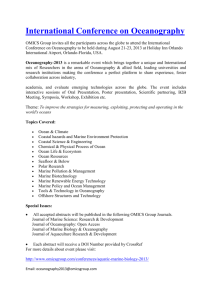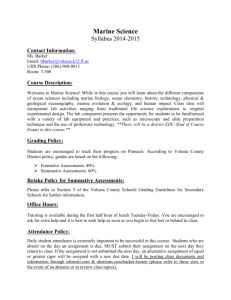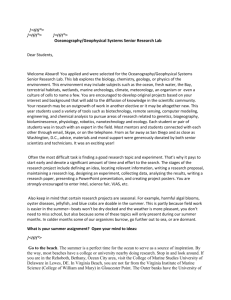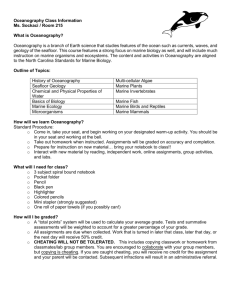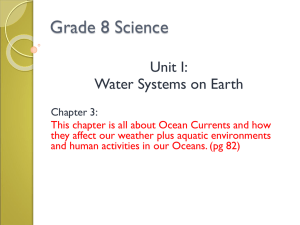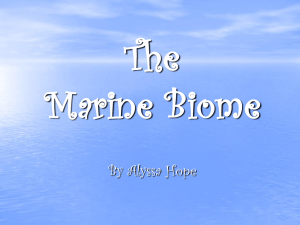View Syllabus - Walla Walla Community College
advertisement
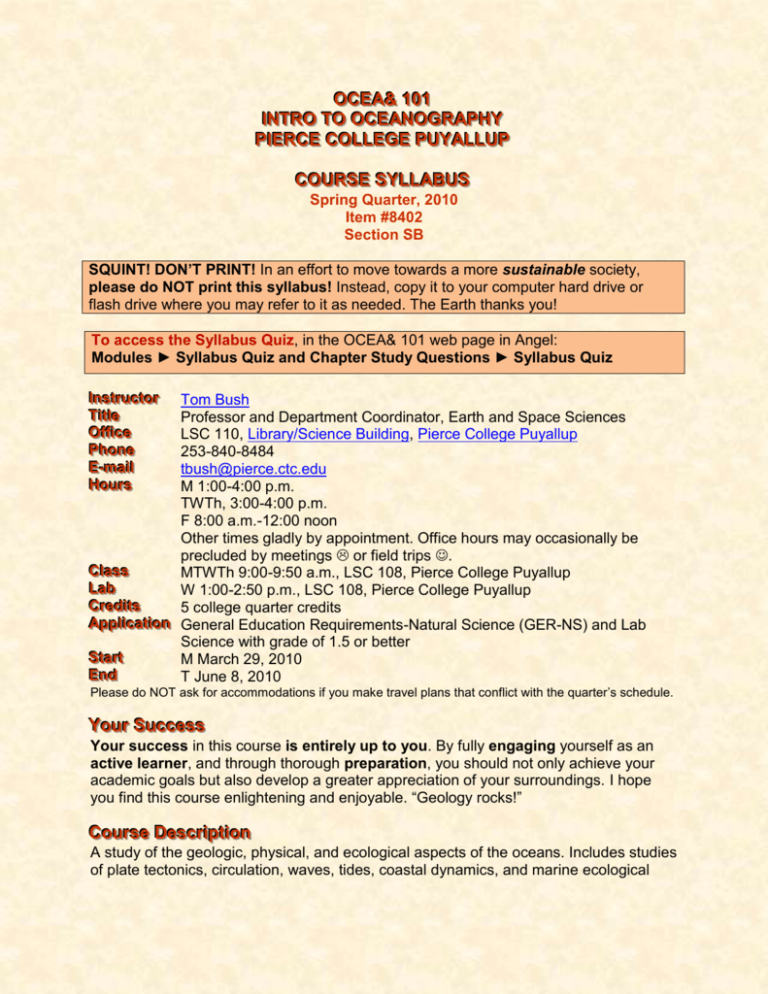
O OC CE EA A& & 110011 IIN NTTR RO O TTO OO OC CE EA AN NO OG GR RA AP PH HY Y P I E R C E C O L L E G E P U Y A L L U PIERCE COLLEGE PUYALLUP P C CO OU UR RS SE ES SY YLLLLA AB BU US S Spring Quarter, 2010 Item #8402 Section SB SQUINT! DON’T PRINT! In an effort to move towards a more sustainable society, please do NOT print this syllabus! Instead, copy it to your computer hard drive or flash drive where you may refer to it as needed. The Earth thanks you! To access the Syllabus Quiz, in the OCEA& 101 web page in Angel: Modules ► Syllabus Quiz and Chapter Study Questions ► Syllabus Quiz IInnssttrruuccttoorr TTiittllee O Offffiiccee P Phhoonnee E E--m maaiill H Hoouurrss Tom Bush Professor and Department Coordinator, Earth and Space Sciences LSC 110, Library/Science Building, Pierce College Puyallup 253-840-8484 tbush@pierce.ctc.edu M 1:00-4:00 p.m. TWTh, 3:00-4:00 p.m. F 8:00 a.m.-12:00 noon Other times gladly by appointment. Office hours may occasionally be precluded by meetings or field trips . C l a s s Class MTWTh 9:00-9:50 a.m., LSC 108, Pierce College Puyallup LLaabb W 1:00-2:50 p.m., LSC 108, Pierce College Puyallup C r e d i t s Credits 5 college quarter credits A Apppplliiccaattiioonn General Education Requirements-Natural Science (GER-NS) and Lab Science with grade of 1.5 or better S t a r t Start M March 29, 2010 E Enndd T June 8, 2010 Please do NOT ask for accommodations if you make travel plans that conflict with the quarter’s schedule. Y Yoouurr S Suucccceessss Your success in this course is entirely up to you. By fully engaging yourself as an active learner, and through thorough preparation, you should not only achieve your academic goals but also develop a greater appreciation of your surroundings. I hope you find this course enlightening and enjoyable. “Geology rocks!” C Coouurrssee D Deessccrriippttiioonn A study of the geologic, physical, and ecological aspects of the oceans. Includes studies of plate tectonics, circulation, waves, tides, coastal dynamics, and marine ecological principles. Appropriate for non-science and science majors. Field trip required. Lab included. C Coouurrssee P Prreerreeqquuiissiitteess There are no prerequisites for this course. With dedication and diligence, it is possible for the student with no prior background in this field to excel in this course. R Reeqquuiirreedd TTeexxttss Garrison, 2009, Essentials of Oceanography, 5th Edition OCEA& 101 Lab Manual R Reeqquuiirreedd M Maatteerriiaallss 5 scan-tron forms for exams #2 pencils for exams and labs Calculator with basic functions (cell phone is okay) Set of colored pencils with 4 colors (for color drawings in lecture notes) C Cllaassssrroooom mP Poolliicciieess Use of cell phones or other communication devices during class, lab, or field trip times may result in expulsion for the day. Please do NOT bring food to class, as eating during class can be a distraction. Beverages are acceptable, but please recycle or dispose of containers appropriately, and clean up after yourself if you spill. Neither food nor beverages are permitted during lab sessions. Please raise your hand if you wish to respond to a question in class, ask a question, or make a comment, and wait to be called upon. Please do NOT speak out during class unless called upon. Attendance is NOT a direct part of your grade. However, responding to my inclass questions when called upon IS, and you must be present to be awarded your participation points when called upon. Absences also mean that you loose the opportunity for learning beyond what is provided by the textbook. Absences from labs or field trips mean that you loose the points for those activities and they may not be made up. Punctuality for class and lab is a fundamental element of professional behavior. I consider tardiness a rude and unnecessary classroom disruption. So is leaving early or getting up during class for any but the most extreme of reasons. Additionally, if you arrive late, you are not eligible for participation points that day (see Assessment of Student Learning below). You are expected to conduct yourself at all times in this class (lectures, labs, field trips) in a manner that is respectful of all and conducive to the learning process in a multicultural educational environment. If you need require any disability accommodations, please contact the Access and Disability Services (ADS) office in ADM 115 or at 253-840-8335. E Em meerrggeennccyy P Prroocceedduurreess Imminent threat to persons and property: call 911 and then Campus Safety at 253-840-8481. Evacuation (intermittent horns and strobes): gather all personal belongings and leave the building using the nearest available safe exit. Be prepared to be outside for one hour and stay a minimum of 200 feet from any building or structure. So long as it is safe to do so, students are expected to stay on campus and return to class after evacuations that last less than 15 minutes. Do not attempt to re-enter the building until instructed by an Evacuation Director (identified by orange vests) or by three horn blasts or bell rings. Please notify the nearest Campus Safety Officer or Evacuation Director of any one left in the building or in need of assistance. G Grraaddiinngg P Poolliicciieess Your course grade is determined by your total points as a percentage of the total points possible according to the grading scale below. A grade of 1.5 (C-) or better is required for this course to count as GER-NS or GTE. With a grade of 0.7 (D-) to 1.4 (D+), this course applies GE only. There are five exams in this course. Your lowest exam OF THE FIRST FOUR EXAMS is dropped from your course grade. Exam #5 counts regardless of its score. Exams must be taken according to the schedule provided, which may be modified by the instructor to fit the lecture schedule needs of the course. Exams MAY NOT be taken early or late if you are unable to take an exam as scheduled. If you miss an exam for any reason (of the first four), it may NOT be made up. This will be your dropped score. If you missed Exam #5, you will receive a zero and this counts towards your grade. Late assignments are generally NOT ACCEPTED (unless under extreme circumstances, and you contact me about your situation on or before the due date). Extra credit opportunities are generally not a part of this course, unless otherwise stated elsewhere in this syllabus or announced in class. C Coom mm muunniiccaattiioonn W Wiitthh IInnssttrruuccttoorr Please consider all emails with me to be of a professional business nature, and therefore you should use proper English, grammar, spelling, and punctuation. Emails not meeting professional business standards may be returned for rewriting before a reply is given. A Accaaddeem miicc IInntteeggrriittyy Academic dishonesty acts (as outlined in the Pierce College Catalog) will result in at least a failing grade for the assignment or exam, or possibly a failing grade for the course, depending on the nature and severity of the act. Y Yoouurr S Sttuuddeenntt G GM MA AIILL A Accccoouunntt If you wish to correspond with me using email, I make the following requests: Communicate via your student GMAIL account to ensure that I will respond promptly. Because of the huge amount of spam that make’s it through the College’s spam filters, I generally don’t open emails from unknown senders in my regular email account. When corresponding via GMAIL, make your emails professional! Please don’t send me emails written in the same style as text messages to a friend! Check for proper spelling, use proper grammar, capitalize where appropriate, and use appropriate business-like language. This is to encourage the development of Effective Communication (see Core Abilities below). Please DO NOT SEND OR FORWARD ME mass emails. P Piieerrccee C Coolllleeggee C Coorree A Abbiilliittiieess It is the goal of Pierce College to prepare students to live and work in a dynamically changing world by emphasizing whole-student development and hands-on learning. Through experiences both in and out of the classroom, you’ll be given the opportunity to broaden your horizons and be challenged in ways that encourage the development of the abilities vital to succeeding in life. These core abilities include: Information Competency: Seeks, finds, evaluates and uses information to engage in lifelong learning. Critical, Creative and Reflective Thinking: A critical, creative, and reflective thinker will question, search for answers and meaning, evaluate ideas and information, and develop beliefs that lead to action. Responsibility:Tthe ability to respond by examining the relationship between self, community, and environments, evaluating potential impacts and consequences of actions, and making choices and contributions based on that examination and evaluation. Effective Communication: The effective exchange of messages in a variety of contexts using multiple methods. Multiculturalism: Valuing open-mindedness, inclusion, multicultural perspectives and multiple ways of knowing, thinking and being. G Geenneerraall C Coouurrssee O Ouuttlliinnee a. b. c. d. e. f. g. Introduction to Oceanography. History of Marine Science. Marine Resources and Pollution. Marine and Coastal Geology. Seawater Properties. Ocean and Atmosphere Circulation. Waves and Tides. h. Marine Ecology. C Coouurrssee O Ouuttccoom meess What you should know and be able to do upon satisfactory completion of this course 1. Describe the role the oceans play in the Earth system. 2. Apply the scientific method and relate basic scientific concepts to geologic processes (e.g. plate tectonics or other examples). 3. Explain how technological advances have increased human knowledge of the oceans throughout history. 4. Describe the origin of important types of renewable and non-renewable marine resources. 5. Communicate the relationship between human activity, marine resource extraction and marine pollution. Communicate solutions to global marine resource extraction and pollution. 6. Describe the plate tectonic processes and the evidence supporting the plate tectonic theory, and relate the tectonic processes to the physical features of the ocean floor. 7. Relate physical and biological processes to the origin and distribution of marine sediments. 8. Explain the various geological and ecological processes of coastal environments and evaluate the impact of human activities on the coastal regions of the world. 9. Analyze various physical and chemical parameters of seawater and relate their effects on marine processes. 10. Describe atmospheric and oceanic circulation and their interrelationship. 11. Describe the formation and movement of waves. 12. Discuss the mechanics of tides and interpret tide tables. 13. Summarize the types of marine life and marine lifestyles and relate marine life to physical marine processes. Describe the major marine communities and discuss the impacts of human activities on them. 14. Access oceanographic data from various sources, including library research, Internet, and field observations. A Asssseessssm meenntt ooff S Sttuuddeenntt LLeeaarrnniinngg Exams, Quizzes, Field Trip, Etc 5 exams (multiple choice and essay); lowest score 50% dropped OF FIRST 4 EXAMS (Exam #5 may NOT be dropped); 1 or more quizzes or other miscellaneous assignments may also be included; 1 field trip (20 points EXTRA CREDIT) to a location of interest (see Course Calendar for location and date) Lab Exercises 8 lab exercises (7 @ 10 points each, 1 @ 20 points) for a total of 90 points 30% Participation Involvement in class discussions about the textbook readings or other assignments 20% TOTAL To calculate your grade + + = 100% (Your Exam, Quiz, Field Trip Points/Total Exam Points Possible) x 50 (Your Lab Points/Lab Points Possible) x 30 (Your Participation Points/Participation Points Possible) x 20 Grade % G Grraaddiinngg S Sccaallee Your course grade is determined by your total points as a percentage of the total points possible according to the grading scale below. 96-100%=4.0 (A) 94-95%=3.9 93%=3.8 92%=3.7 91%=3.6 90%=3.5 (A-) 89%=3.4 (B+) 88%=3.3 87%=3.2 86%=3.1 85%=3.0 (B) 84%=2.9 83%=2.8 82%=2.7 81%=2.6 80%=2.5 (B-) 79%=2.4 (C+ 78%=2.3 77%=2.2 76%=2.1 75%=2.0 (C) 74%=1.9 73%=1.8 72%=1.7 71%=1.6 70%=1.5 (C-) 69%=1.4 (D+) 0-59%=0.0 (F) 68%=1.3 67%=1.2 66%=1.1 65%=1.0 (D) 64%=0.9 63%=0.8 60-62%=0.7(D-) A grade of 1.5 (C-) or better is required for this course to count towards as Core Requirement (Natural Science) or a Core Elective (GTE) course. A grade of 0.7 to 1.4 (D- to D+) applies only towards GTEs. C Coouurrssee M Moodduulleess--M Maajjoorr TTooppiiccaall S Seeccttiioonnss Module Description Textbook Chapters Module 1 Introduction to Oceanography Exam #1 Introduces the student to the science of oceanography, including the origin of the Earth, its oceans and atmosphere, and its life. We also take a brief look at marine resources and pollution, followed by brief discussions on the history of oceanography. Chapter 1: Origins Chapter 15: Uses and Abuses Chapter 2: History Module 2 Marine Geology Exam #2 Tectonics and the tectonic origin of the ocean basins and its features; study of the sediments that blanket the seafloor and their origin. Chapter 3: Plate Tectonics Chapter 4: Ocean Basins Chapter 5: Sediments Module 3 Physical Oceanography Exams #3 Physical process of the oceans, starting with an all-important look at physical and chemical properties of water, which forms a foundation for later discussions. We also examine the close link between atmosphere and ocean circulation. Chapter 6: Water Chapter 7: Atmospheric Circulation Chapter 8: Ocean Circulation Module 4 Physical Oceanography Exams #4 Continuation of the study of the physical Chapter 9: Waves processes of the oceans with the study of Chapter 10: Tides waves and tidal patterns. We conclude Chapter 11: Coasts this section with a look at coastal dynamics. Module 5 Marine Ecology Exam #5 A brief introduction to life in the oceans and its inter-relationships. Chapter 12: Life in the Ocean Chapter 13: Pelagic Communities Chapter 14: Benthic Communities

